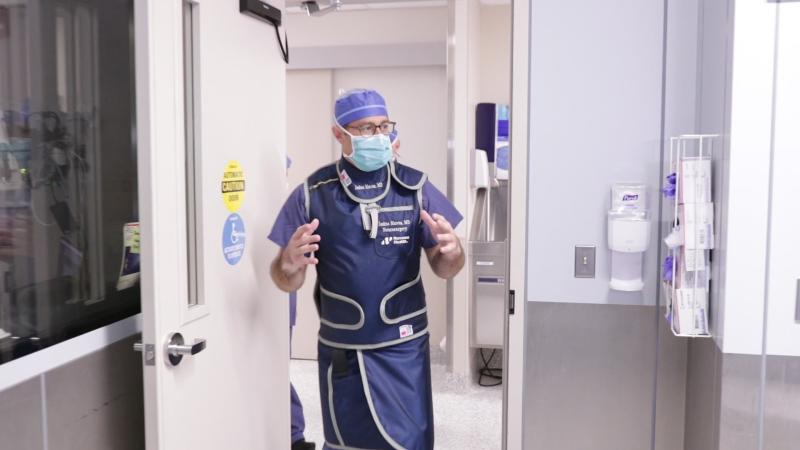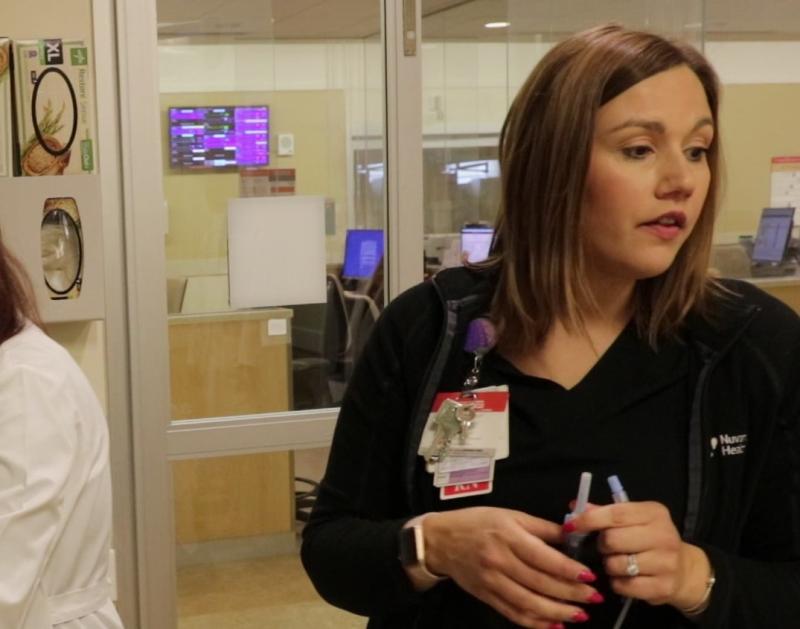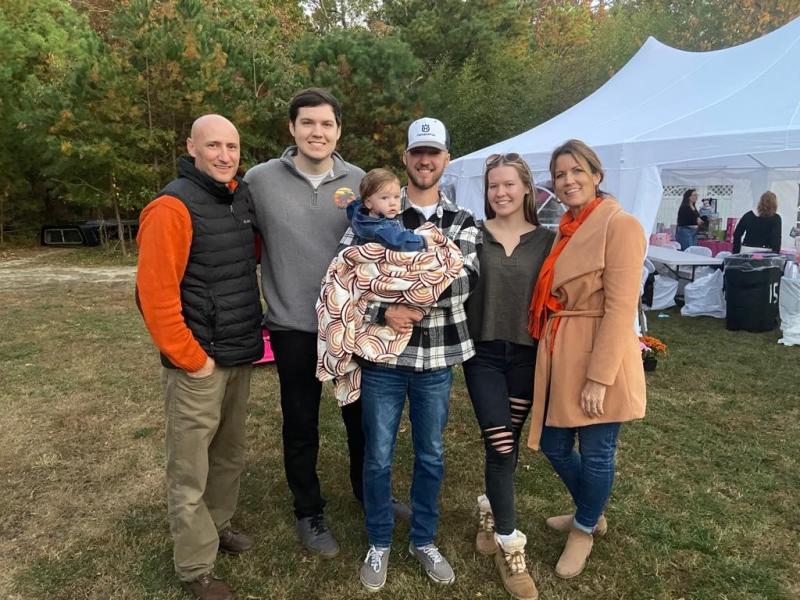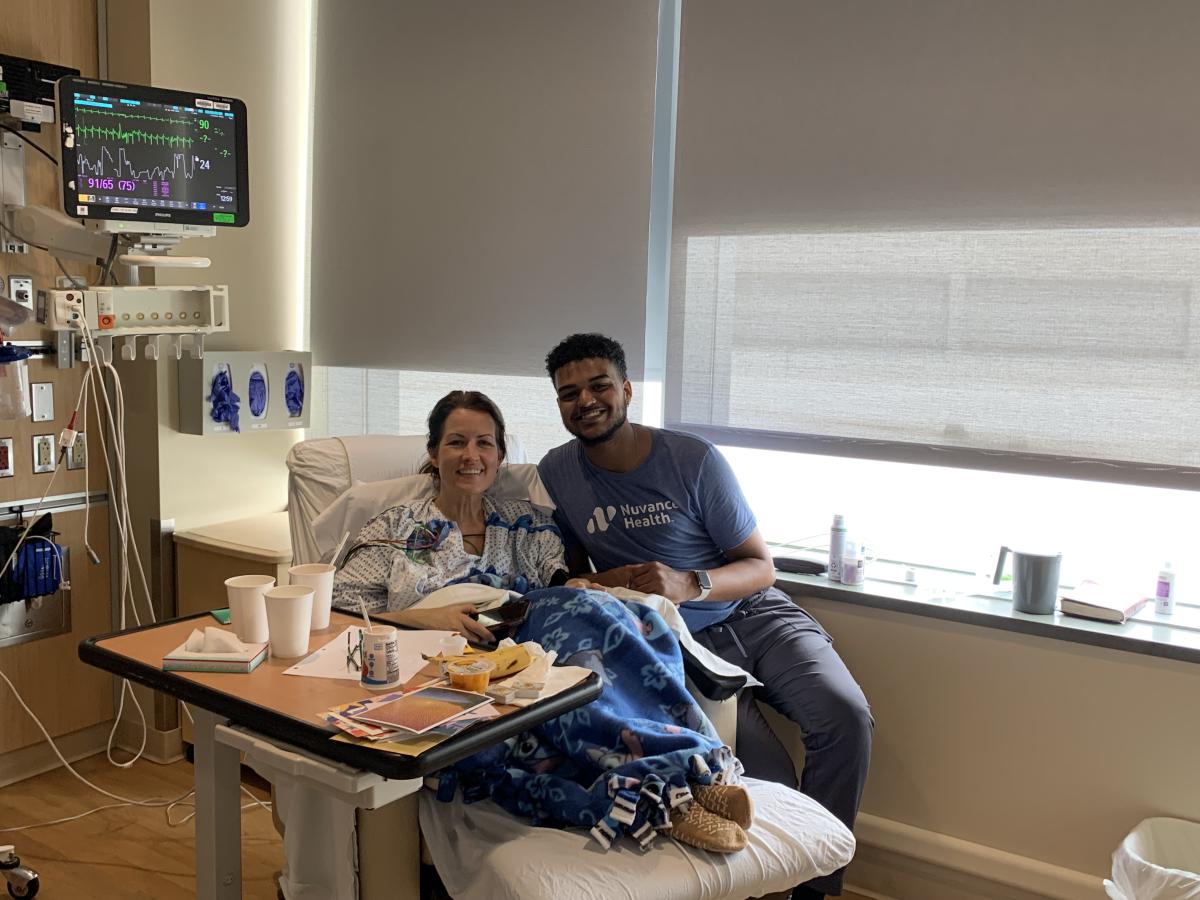Providing your location allows us to show you nearby locations and doctors.
Woman survives a stroke, heart attack and pulmonary embolism, in short order
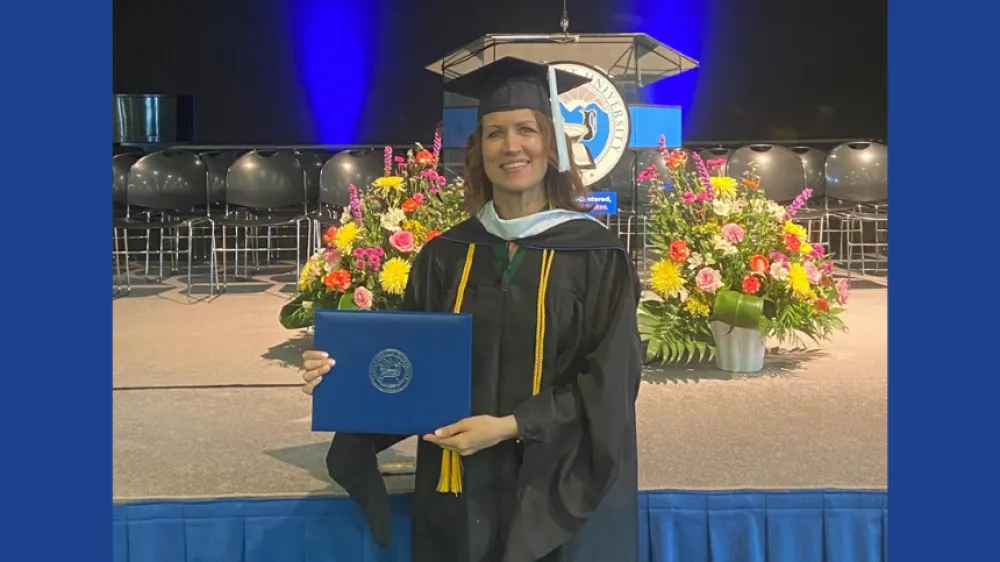
05/24/2024
Amie Stearns says family, faith and excellent care helped her overcome three life-threatening events caused by an unknown congenital heart condition.
Amie Stearns’ typical morning at home took a drastic turn, completely out of the blue. She was filling a glass with water from the refrigerator when suddenly she was having trouble filling it. Water was spilling on the floor.
“I was aware something was wrong, but was unsure how to fix it,” Amie said.
Amie’s daughter was home and heard the water splashing on the floor.
“She yelled, ‘Mom!’ but I couldn’t answer,” Amie said.
Showing signs of a stroke
Amie’s daughter checked on her and immediately saw something was wrong.
“She held onto me and led me to a chair,” Amie said. “I was in a weird space; it was like a time warp. I knew something was happening but didn’t know what it was. I was half aware of my thoughts and half aware of my body.”
“It felt like something was pulling me down, and I had an innate sense to lay down,” Amie said.
“I remember my daughter crying and calling 911,” Amie said. “EMS came quickly, and I remember being touched, moved and lifted to get down the stairs.”
Related content: Stroke 101 and why it’s critical to call 911 for symptoms
Emergency treatment for a stroke
Amie said she fell in and out of consciousness on the ambulance ride to New Milford Hospital.
New Milford Community Ambulance emergency medical services (EMS) took Amie to the Arnhold Emergency Department at New Milford Hospital, where a specially trained stroke rapid response team evaluated her quickly.
Emergency medicine physician Dr. Mary Mackessy initiated Amie’s assessment and neurologist Dr. Charles Guardia evaluated Amie. The evaluation and a CT scan, read by radiologist Dr. Steven Sherry, confirmed Amie had an ischemic stroke.
During an ischemic stroke, a clot blocks blood flow to the brain. “Time is brain” when it comes
to stroke because brain cells die from lack of blood and oxygen. Quick treatment is the difference between a good outcome or long-term disability or death.
Related content: Top 4 things you need to know about stroke
The stroke team stabilized Amie and administered a clot-busting medication to break up the blockage and restore blood flow to the brain. Amie also needed a procedure to remove the clot, called a mechanical thrombectomy.
Learn more about acute stroke treatment at the Nuvance Health Neuroscience Institute.
A neurosurgeon treats the stroke with a mechanical thrombectomy
“I remember someone holding my eyes open to look at them and then can’t remember much after that,” Amie said. “I vaguely remember going to Danbury Hospital.”
As a campus of Danbury Hospital, New Milford Hospital stroke patients who need a higher level of care are safely and swiftly transferred by Nuvance Health Ambulance. Danbury Hospital has an advanced biplane angiography system and Thrombectomy-Capable Stroke Center certification from The Joint Commission — a designation for high-quality stroke care and positive outcomes.
Dr. Joshua Marcus, a neurosurgeon at Nuvance Health and chief of neurointerventional surgery at Danbury Hospital and Norwalk Hospital, performed the mechanical thrombectomy. He used X-ray guidance to lead a catheter through an artery in Amie’s thigh, up the aorta and into the brain to remove the clot and restore blood flow.
Dr. Marcus and the Norwalk Hospital stroke team performed the first mechanical thrombectomy in Connecticut in 2016. The procedure increases the stroke treatment time from 4.5 hours to 24 hours, giving people a better chance of fully recovering.
Related content: Woman survives massive stroke thanks to quick action and mechanical thrombectomy at Norwalk Hospital
Overcoming a heart attack and pulmonary embolism
After the procedure, Amie woke up in the Danbury Hospital Intensive Care Unit (ICU).
“I thought, ‘Where am I? What happened?’ ” Amie said.
Amie discovered she had a rare congenital heart condition called a membranous septal aneurysm that caused blood clots to form.
“My doctors described it as popcorn. The clots were like kernels forming in my heart. When one popped, it went to my brain,” Amie said.
She would eventually need heart surgery, but she needed to recover from the stroke first.
For 49 years, Amie never had symptoms of the condition and was shocked to learn about it.
“It was traumatic learning about my heart condition,” Amie said.
Related content: Find out why women have a higher risk for stroke
Amie was doing well; her vital signs were good, and she was even moved out of the ICU.
“I only experienced stroke side effects for about 24 hours after the procedure,” Amie said. “I had a bit of facial drooping and delayed fine motor skills and walking on my right side.”
Related content: Rehabilitation from a stroke, your questions answered
But suddenly, she was out of breath and had a heavy, seizing feeling in her chest.
“It felt like warm liquid was escaping from my heart,” Amie said.
Anthony “Winni” Sanchez, a patient care technician (PCT) at Danbury Hospital, ran into the room.
“I will never forget him; he is such a beautiful person. He knew what was happening and within seconds, there was a group of people in the room,” Amie said.
Amie was having a heart attack, and Winni initiated a rapid response alert. Amie would later learn two more clots popped off and traveled to her heart.
One of the rapid response team members was Lauren Henriques, an advanced stroke-certified and neurovascular registered nurse and neuroscience coordinator at Danbury Hospital.
“Lauren took over; she owned that room. I was terrified but knew they were working to save me,” Amie said.
“This time, I was very aware of what was happening. I kept saying, ‘Please help me,’ and I felt myself fighting. I remember sweating profusely before passing out,” Amie said.
As if she had not been through enough, she also suffered a pulmonary embolism, which happens when a clot goes to the lungs, cutting off blood and oxygen.
Amie had emergency procedures to treat the heart attack and pulmonary embolism.
“I had all the things,” Amie said. “But it was not my time to go.”
Cardiac surgery to treat congenital heart condition
Six months later, when it was safe for her to have surgery, Amie had an open-heart operation to repair the congenital heart condition.
Leading up to the surgery, she was on a medication regime, including blood thinners, to reduce the risk of more clots forming.
“I had the option to stay on medications for the rest of my life or have surgery. I chose surgery to have peace of mind that it was taken care of,” Amie said.
Enjoying the moments after overcoming a stroke and much more
Today, Amie said she is feeling “grateful.”
She is thankful for her daughter, who was not supposed to be home the morning of April 17, 2023.
“My daughter was supposed to be taking a final exam at her college. But that morning, they changed the test time to later, so she did not need to leave as early,” Amie said.
Amie’s husband had rushed home from work and was by her side every step of the way.
Amie shared that some of the hardest things were not having control over the situation, “The body does what it wants to,” she said.
It was also difficult watching her family — especially her daughter — go through it with her. Amie is a mom of three and has a grandbaby. She said being surrounded by her family has helped her heal, as well as having a strong faith.
Her faith is one reason she shared her experience — to help others.
In addition to her family, she is thankful for the “excellent care” Danbury Hospital and New Milford Hospital provided to her and her family.
“Everyone was so encouraging and positive; it went a long way,” Amie said.
Winni even earned a Safety Star Award from Danbury Hospital for saving Amie!
While Amie feels well physically, she is managing post-traumatic stress disorder (PTSD) from her experience.
Amie worked in childcare and education before recently becoming a mental health counselor.
“Going through this experience has solidified that mental health is just as important as physical health,” Amie said. “Things don’t just stay with your body, but your mind, too — both need to heal.”
Amie is looking forward to “living a good life.” She loves being outside and traveling.
She shared, “Going through something like I did puts things in perspective. I want to enjoy all the moments and not rush through them.”
Learn more about stroke and other cerebrovascular diseases.
Disclaimer: Outcomes from stroke vary from person to person. No individual results should be seen as typical.
